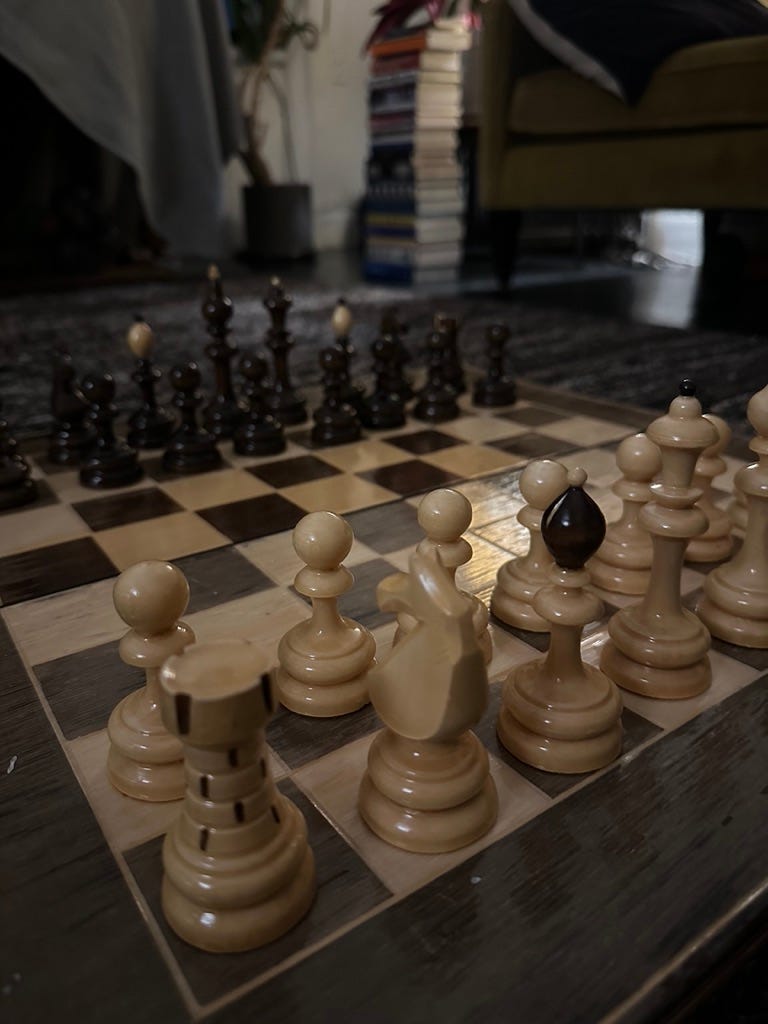Chess
This is Western Coffee—notes on building the creative body. Last time: Climbing. The whole series is here. Please share this email; you can sign up free below.
One summer in college, I started playing a chess program on my computer that would score the outlook of the game as it progressed. Turn by turn, it rated which side was favored to win and how confidently, given pieces captured and the positions of the ones left on the board. The sacrifice of an inconsequential-seeming pawn or the ill-timed deployment of a queen: These were sins whose cost was knowable and discrete. Trivial mistakes contributed to a loss as surely as the slow accumulation of a failed strategy. The game I’d been playing casually since my dad taught it to me as a little kid acquired a new flavor of ruthlessness.
And this was, in a way, addictive. Maybe you’ve had the experience of playing something—Tetris, Angry Birds, Fortnite, poker, the crossword—so often and intensely that the thought patterns you apply to it start showing up elsewhere, in dreams and then as you walk down the street. I don’t want to overstate what happened to me that summer, which was not an Aronofsky film. But I did come, for a season, to see my stance in life at any given moment in terms of a positive or negative number; it became harder to believe that any action, or failure to act, would not compound into a later, graver outcome.
(It occurs to me that this was also the time when I was breaking from Mormonism, in which sins and virtues, each with a meticulously calculated weight, are always affecting one’s prospects for salvation. Mormons open the door wide to heaven, but what you get on the other side is subtly stratified, like an airplane. You have to fight even for the backhanded compliment of Comfort Plus. If you do get stuck in coach, never fear: You’ll be with the gays.)
I revived my chess game recently, after a couple years off. That college-era filter of brutal consequence has faded, in part because the board unfolds now more as a canvas than as a math problem. But in its place descends the predictable lens of almost-40-hood: What’s possible starts big and gets smaller. And this narrowing is not a product just of space—the array of moves available to your pieces—but also, really more, of time. My rook could put that king in checkmate if I had three moves without any response from the opponent. But life is fragmental; we do not, for the most part, conjure changes of whole reality. The runner does not awake tomorrow ready all at once for a marathon. He doesn’t even prepare in a line, but guesses and blunders and forgets and doubles back and tries again, or doesn’t. The chess-scoring model is blind to much of this because it expects a sequence in one direction. But chess becomes more interesting, more human, I think, when moves can be questioned, altered, annotated. I did this with a rival the other night, backing up a few steps from the end by common consent. And without stirring from our seats, we played out a whole different game.
Kindly send me your thoughts, questions, and provocations: dmichaelowen@gmail.com. And say hi on Instagram, or let’s Peloton together: @leggy_blond.

